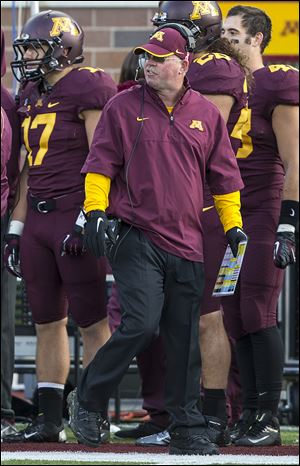
Minnesota football coach says he has 15-20 seizures annually
11/3/2012
Second-year Minnesota coach Jerry Kill has chosen to live and coach with a neurological condition that affects more than 2 million people nationwide.
MINNEAPOLIS — Jerry Kill has maintained that his health won’t force him to quit coaching football.
Instead, the second-year Minnesota coach has chosen to live and coach with a neurological condition that affects more than 2 million people nationwide.
Michigan faces Minnesota at noon today at TCF Bank Stadium, and as part of Epilepsy Awareness Month the Minnesota football team and its coaches will wear purple in support of and to raise awareness for those affected by epilepsy.
That includes Kill, who said last month he suffered between 15-20 seizures a year — including one in Minnesota’s locker room after a 21-13 loss Oct. 13 to Northwestern.
“I’ve had a lot of people who’ve talked and so forth, from coaches, to kids, to people who have epilepsy, who’ve had situations like mine,” said Kill, who was also diagnosed with kidney cancer in 2005. “You pass along your experiences, and you have to take care of yourself and listen to the people that care about you.”
Wolverines coach Brady Hoke considers Kill as a “hard-nosed guy” whose teams are reflective of their coach.
“We talk, but I don’t talk to a whole lot of people,” Hoke said. “But he’s in great shape. He’s been battling some things, but he’s in great shape.”
Kill is unique in that there aren’t many coaches or athletes who are open about having epilepsy. Among those are Atlanta Falcons tight end Jason Snelling, former NFL offensive lineman Alan Faneca, and former NBA star Bobby Jones.
Florence Griffith Joyner, who won three Olympic gold medals in track and field in 1988, died in her sleep 10 years later after suffering an epileptic seizure.
Dr. Michael Nagel, a neurologist with ProMedica who works out of the Toledo Clinic, explained that epilepsy is a neurological condition in which a person is prone to having seizures. But unlike seizures caused by head trauma, tumors, or diseases such as meningitis, there is no root or underlying cause of a seizure for an epileptic.
Add that to the fact that being a college football coach is not a low-stress endeavor. Instead, it’s a certain kind of lifestyle that takes over through the course of the year, and intensifies from August through mid-winter. And coaching at the FBS level hasn’t come without noted health issues among its coaching ranks.
In September, Nebraska coach Bo Pelini was hospitalized during the Huskers’ 42-13 win against Arkansas State, but said two days later that he suffered from an upset stomach and dizziness during the game, and was given a clean bill of health.
Ohio State coach Urban Meyer resigned from Florida after the 2009 season because of health issues — then returned a day later, before resigning again after the 2010 season, citing his family and his health.
Michigan State coach Mark Dantonio suffered a heart attack hours after the Spartans defeated Notre Dame on Sept. 19, 2010, and missed two games recovering from a heart procedure and a blood clot.
“I am surprised it doesn’t happen more often,” Purdue coach Danny Hope told AnnArbor.com after Dantonio’s heart attack in 2010. “The game has gotten a lot bigger in the last 10, 15 years, now to the point where, if you are a coach at the BCS level ... it becomes just about life-consuming.”
But like other diseases and medical conditions, in the case of epilepsy, Nagel said there’s a certain methodology to controlling it — especially in a high-stress occupation.
“It’s important to be open about the condition,” Nagel said, adding that the mainstay for controlling epileptic seizures is a prescribed regimen of medication. “It’s a condition that can be stigmatized. As far as maintaining it, you try to get regular sleep as much as possible.
“Moderate your lifestyle. You don’t want to do excessive things within your lifestyle. You work on stress reduction and management, and for the most part, it’s usually manageable.”
Four days after suffering a seizure following the loss to Northwestern, Kill told the media covering Minnesota that he would not continue to discuss his condition because it doesn’t affect his job.
He also admitted that there was frustration in not knowing others who understood what he was going through, having a condition that affects a small percentage of Americans. But earlier this week, in preparation for today’s game against the Wolverines, Kill considered the position he is in, as an advocate, as a coach and as a leader.
“When you’re in a situation and you’re a head football coach, whether you’re at Toledo or Minnesota, the great thing about the profession is that you touch a lot of peoples’ lives,” Kill said. “You can either help or be positive, or not be, and I just try to be as helpful or positive as I can.”
Contact Rachel Lenzi at: rlenzi@theblade.com, 419-724-6510 or on Twitter @RLenziBlade.